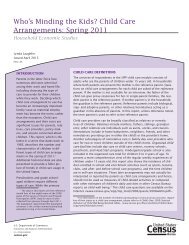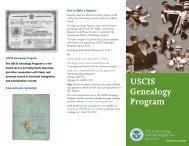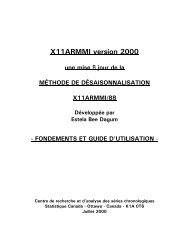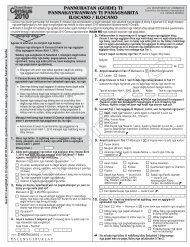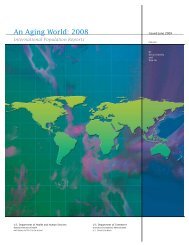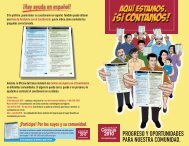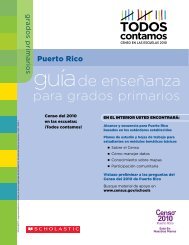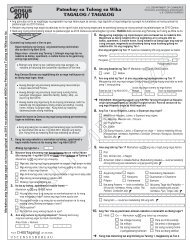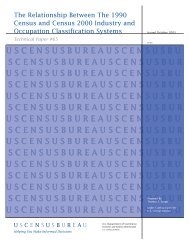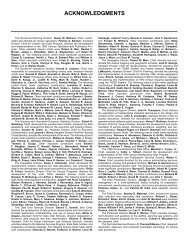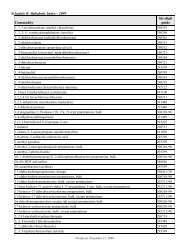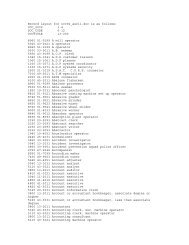Current Population Survey Design and Methodology - Census Bureau
Current Population Survey Design and Methodology - Census Bureau
Current Population Survey Design and Methodology - Census Bureau
You also want an ePaper? Increase the reach of your titles
YUMPU automatically turns print PDFs into web optimized ePapers that Google loves.
Chapter 11.<br />
<strong>Current</strong> <strong>Population</strong> <strong>Survey</strong> Supplemental Inquiries<br />
INTRODUCTION<br />
In addition to providing data on the labor force status of<br />
the population, the <strong>Current</strong> <strong>Population</strong> <strong>Survey</strong> (CPS) is<br />
used to collect data for a variety of studies on the entire<br />
U.S. population <strong>and</strong> specific population subsets. These<br />
studies keep the nation informed of the economic <strong>and</strong><br />
social well-being of its people <strong>and</strong> are used by federal <strong>and</strong><br />
state agencies, private foundations, <strong>and</strong> other organizations.<br />
Supplemental inquiries take advantage of several<br />
special features of the CPS: large sample size <strong>and</strong> general<br />
purpose design; highly skilled, experienced interviewing<br />
<strong>and</strong> field staff; <strong>and</strong> generalized processing systems that<br />
can easily accommodate the inclusion of additional questions.<br />
Some CPS supplemental inquiries are conducted annually,<br />
others every other year, <strong>and</strong> still others on a one-time<br />
basis. The frequency <strong>and</strong> recurrence of a supplement<br />
depend on what best meets the needs of the supplement’s<br />
sponsor. In addition, any supplemental inquiry must meet<br />
strict criteria discussed in the next section.<br />
Producing supplemental data from the CPS involves more<br />
than just including additional questions. Separate data<br />
processing is required to edit responses for consistency<br />
<strong>and</strong> to impute missing values. An additional weighting<br />
method is often necessary because the supplement targets<br />
a different universe from that of the basic CPS. A supplement<br />
can also engender a different level of response or<br />
cooperation from respondents.<br />
CRITERIA FOR SUPPLEMENTAL INQUIRIES<br />
A number of criteria to determine the acceptability of<br />
undertaking supplements for federal agencies or other<br />
sponsors have been developed <strong>and</strong> refined over the years<br />
by the U.S. <strong>Census</strong> <strong>Bureau</strong>, in consultation with the U.S.<br />
<strong>Bureau</strong> of Labor Statistics (BLS).<br />
The staff of the <strong>Census</strong> <strong>Bureau</strong>, working with the sponsoring<br />
agency, develops the survey design, including the<br />
methodology, questionnaires, pretesting options, interviewer<br />
instructions <strong>and</strong> processing requirements. The <strong>Census</strong><br />
<strong>Bureau</strong> provides a written description of the statistical<br />
properties associated with each supplement. The same<br />
st<strong>and</strong>ards of quality that apply to the basic CPS apply to<br />
the supplements.<br />
The following criteria are considered before undertaking a<br />
supplement:<br />
<strong>Current</strong> <strong>Population</strong> <strong>Survey</strong> TP66<br />
U.S. <strong>Bureau</strong> of Labor Statistics <strong>and</strong> U.S. <strong>Census</strong> <strong>Bureau</strong><br />
1. The subject matter of the inquiry must be in the public<br />
interest.<br />
2. The inquiry must not have an adverse effect on the<br />
CPS or other <strong>Census</strong> <strong>Bureau</strong> programs. The questions<br />
must not cause respondents to question the importance<br />
of the survey <strong>and</strong> result in losses of response or<br />
quality. It is essential that the image of the <strong>Census</strong><br />
<strong>Bureau</strong> as the objective fact finder for the nation is not<br />
damaged. Other important functions of the <strong>Census</strong><br />
<strong>Bureau</strong>, such as the decennial censuses or the economic<br />
censuses, must not be affected in terms of<br />
quality or response rates or in congressional acceptance<br />
<strong>and</strong> approval of these programs.<br />
3. The subject matter must be compatible with the basic<br />
CPS survey <strong>and</strong> not introduce a concept that could<br />
affect the accuracy of responses to the basic CPS information.<br />
For example, a series of questions incorporating<br />
a revised labor force concept that could inadvertently<br />
affect responses to the st<strong>and</strong>ard labor force<br />
items would not be allowed.<br />
4. The inquiry must not slow down the work of the basic<br />
survey or impose a response burden that may affect<br />
future participation in the basic CPS. In general, the<br />
supplemental inquiry must not add more than 10 minutes<br />
of interview time per respondent or 25 minutes<br />
per household. Competing requirements for the use of<br />
<strong>Census</strong> <strong>Bureau</strong> staff or facilities that arise in dealing<br />
with a supplemental inquiry are resolved by giving the<br />
basic CPS first priority. The <strong>Census</strong> <strong>Bureau</strong> will not<br />
jeopardize the schedule for completing the CPS or<br />
other <strong>Census</strong> <strong>Bureau</strong> work to favor completing a<br />
supplemental inquiry within a specified time frame.<br />
5. The subject matter must not be sensitive. This criterion<br />
is imprecise, <strong>and</strong> its interpretation has changed<br />
over time. For example, the subject of birth expectations,<br />
once considered sensitive, has been included as<br />
a CPS supplemental inquiry.<br />
6. It must be possible to meet the objectives of the<br />
inquiry through the survey method. That is, it must be<br />
possible to translate the supplemental survey’s objectives<br />
into meaningful questions, <strong>and</strong> the respondent<br />
must be able to supply the information required to<br />
answer the questions.<br />
7. If the supplemental information is to be collected during<br />
the CPS interview, the inquiry must be suitable for<br />
the personal visit/telephone procedures used in the<br />
CPS.<br />
<strong>Current</strong> <strong>Population</strong> <strong>Survey</strong> Supplemental Inquiries 11–1





